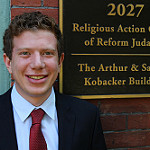
“You shall not insult the deaf, or put a stumbling block before the blind. You shall fear your God: I am the Eternal.”
Leviticus 19:14
As the legislative assistant who manages the disability rights portfolio for the Religious Action Center of Reform Judaism (RAC), I see and hear this quote often. It is a powerful reminder of the biblical enjoinment to treat people with disabilities justly, and to work for policies that ensure their rights.
Interestingly, this commandment is not a reminder to treat all people equally. In fact, it singles out behavior that is unacceptable explicitly because of the people affected. Not cursing the deaf and not placing a stumbling block before the blind remind us, first and foremost, about the ways in which people are affected by their disabilities. This idea also can be seen in legislation such as the Individuals with Disabilities Education Act (IDEA), which has been crucial in ensuring that students with disabilities have access to the educational opportunities they deserve and to which they are entitled. For years, students received ill-suited instruction or were excluded from classrooms altogether, neither of which met the unique needs of each student. IDEA is a policy that reflects the value taught in Leviticus 19:14: disabilities should not be ignored; rather they should be accepted and accommodated in their individual contexts.
In a similar vein, the passage reminds each of us to dialogue continuously with those with disabilities. Cursing the deaf and placing stumbling blocks before the blind are not only reprehensible acts, but also diminish contact between people. Therefore, when interacting with a person with a physical disability, for example, we must remember to inquire whether he or she wants help when opening a door or rather would do so on her own.
When considering policy remedies or how to increase inclusion efforts, people with disabilities must lead, and their views and experiences must be central to these efforts. It is important that our advocacy efforts include personal stories about the ongoing impact of the Americans with Disabilities Act (ADA) on the everyday lives of people with disabilities, and that we all do our part to communicate the continued importance of the ADA and similar laws.
Finally, the passage from Leviticus connects how we treat people with disabilities with our own spirituality and closeness to God. Part of our commitment to inclusion and equal treatment of people with disabilities stems from the fact that all people are created in the Divine image. In addition, we are reminded that our actions should reflect that we are part of a world greater than ourselves. For me, spirituality is largely about the recognition that there is more to life than what is immediately apparent in my own personal experiences. This humility commands us to act with dignity on behalf of all people, and with consciousness about the ways in which we can adapt to and respect differences.
Such is the religious directive that will compel me and others to advocate with and for the rights of people with disabilities on February 2, at Jewish Disability Advocacy Day (JDAD), part of Jewish Disability Awareness and Inclusion Month. Please join us on JDAD to raise our collective voice and urge our lawmakers to support legislation that enhances the rights and inclusion of people with disabilities.
Visit the RAC’s disability rights page to learn about other ways you can speak truth to power on behalf of people with disabilities, including strategies to prevent passage of legislation such as the ADA Education and Reform Act, which would substantially curtail the power of the ADA.




